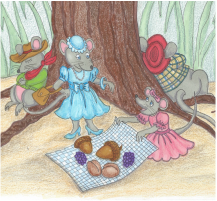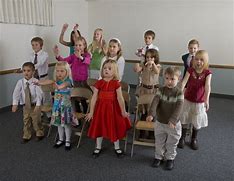
While in Paris, I hope you sample "La joie de vivre!" and "Bien manger!"
While MoTab is on tour, our Summer Theater Production will show off its own "Joie de vivre!" and "Bien manger!"
 So, I have been channeling my energy into writing music for a new Children's Musical instead of moaning over the fact that I am not touring this summer in Europe with the Mormon Tabernacle Choir. In my research for a song for the character of the French maid, I studied some common French phrases. "La joie de vivre!" and "Bien manger!" were two that were irresistible to build a song around. In the play, the maid manages to convince the guest how wonderful the sights and sounds and flavors of the City really are. She says that the French have a saying that "you do not live unless you live joyously." And then later she follows up with "and it is not enough to live joyously, mais non, it's not just how you live, but how you EAT!" While in Paris, I hope you sample "La joie de vivre!" and "Bien manger!" This is an early DEMO recording of As the French Say from the new Children's Musical "The Country Mouse and the City Mouse." (This expanded version with bigger cast and extra songs has yet to be published, but is coming soon.) You'll need to imagine the City Mouse and her French Maid trying to convince the Country Mouse that the City has oh so much to offer --- lights, music, excitement and most of all access to the Pantry and CHEESE! During the song, other City Mice join in to create an exuberant production number "a la Can-Can." The costumes are "1950's" inspired in bright colors, flared skirts, fancy hats and polka dots!
While MoTab is on tour, our Summer Theater Production will show off its own "Joie de vivre!" and "Bien manger!"
0 Comments
 Transition songs can be almost any song you choose, preferably short songs --- such as "Reverently Quietly" as a reverent song transitioning to a quiet activity, or "We Bow Our Heads" as a Prayer Song, or "My Hands" as a wiggle song to be used going from a quiet story in Sharing Time to an Activity such as coloring in Sharing Time. The key is to use the same Transition songs for a long enough time. You may want to use the same Opening Song, Prayer Song, Reverence Song and Wiggle Song for an entire month. These can be signals for what comes next. The Opening song (always a song about Heavenly Father or Christ and His Gospel) calls the meeting to order and signals when to focus on the speaker at the pulpit for announcements. The Prayer song signals to fold your arms and get ready for prayer. The Reverent Song can be used at any moment to transition from a louder activity to a quiet story or talk or a special Guest's message. The "wiggle" song is important to use as a change of pace or for when the children just need to move. It is important to have variations in doing a wiggle song - fast, slow, loud, soft, high, low. It can be done with broad movements or completely silent or anything in between depending on what needs to be taught or accomplished. "My Hands" is an excellent choice because it ends quietly with the arms folded. When the children understand that there are plenty of different activities in Primary including movement and creative expression, they are very willing to sit patiently through the periods of quiet time. NEVER --- AT ANY TIME --- and I repeat --- NEVER should the singing be allowed to get out of control with yelling, wildness, or using obnoxious sounds, disrespectful voices or motions. (Most kids, when given the chance will always opt for silliness over respectfulness. So never give them that opportunity!!!!) Children naturally have light high voices and should NEVER be encouraged to sing louder than their instruments can produce healthfully. If children are encouraged to yell, they do not learn to LISTEN to and match PITCHES. A good music leader should ALWAYS try to teach in-tune singing!!!!!!! The children should be encouraged to fill up with air and use their support muscles to sing with beauty. That is true power. They should be taught that music can be a conduit to the Spirit. Through their lovely in-tune singing, they can invite the Spirit to be with them in Primary. I have visited many, many Ward Primaries throughout the Church and a common problem is that the inexperienced Song Leader does not realize that by encouraging the children to sing loudly and always do big actions, they are creating their own worst nightmares. They wonder why the children are so irreverent and uncontrollable and why they do silly things like jump up when they sing "Jesus wants me for a Sun -- BEEP!" Save the silly actions for the wiggle songs and cultivate an attitude of respect for songs about Jesus Christ, our Savior and Redeemer. I know through many years of practical experience that these principles work. My heart aches to see the rising generation growing up without learning to feel and know the Spirit through these beautiful Primary songs. When children learn these songs, they can draw upon the powerful yet simple gospel messages they contain as they need guidance in their lives. Several years ago, I had the opportunity to teach music at a school for children with learning differences. These children came to this special school to learn reading, writing, math, science, all the subjects, even though they had difficulties with dyslexia, dysgraphia, executive functioning disorders, Asperger's Syndrome, many problems on the Autism spectrum, and other types of learning differences. In working with these children, I was encouraged to use Music in particular ways to help them TRANSITION from one activity to another activity. The younger children especially needed very regular patterns and schedules to help them feel comfortable during the class period and help them understand and patiently endure the passing of time. We teachers were encouraged to post the daily class schedule on the board or on a poster in the front of the class. Our 40 minute periods needed to be divided into activities that could be accomplished in small increments time. And each period needed to be scheduled in a very regular pattern of expected activities. A major goal of this school was to help these students learn to manage themselves, their expectations, their patience and comfort levels, so that they could function doing difficult learning tasks. Even the regular classroom teachers used music for TRANSITIONS between activities. Music helped regulate the tasks and help the students know what was expected of them. A certain song was played to help the K-3 students finish a task and put away their "tools." A certain song was played to set the mood of the activity. A certain song was played to unify the group in getting excited about an activity, or calm them down for a quiet activity, etc.  At the same time, our Ward Primary had two young people with severe Autism. The presidency was at their wits end trying to figure out what to do to see to their needs as well as serve the other children in Primary. I suggested that we use some of the same principles I was using at this special school. We made a Schedule poster for the front of the classroom and gave the two children their own smaller version of the schedule poster. Their versions were laminated so that they could mark when we had accomplished each of the sections of the schedule. We decided that until the schedule was well understood, we would use the same songs as TRANSITIONS between activities. We used the same Reverence Song, Prayer Song, Activity Song, and other short songs as TRANSITIONS for an entire month. The Opening Exercises, Sharing and Music Times went on as normal, but a bit more time regimented. What we discovered is that all of the children in Primary benefited from the regularities of the schedule. Reverence was at a high level because the children understood the routines. They could manage to be still and quiet during the Opening Exercises because they knew it was fairly short. Then they would get a "wiggle song" to help them TRANSITION to Sharing Time or Music time. We learned to "read" the signs of just how long our presentations could reasonably be, and learned to adjust accordingly to maintain reverence or interest in the activity. Before long, routines were in place and we no longer needed the Schedule Posters (but we kept to the routine). The key ingredient in our success was to use MUSIC for TRANSITIONS. Music is a Heavenly gift. And where something has a use for GOOD, the Adversary understands it has an equal use for nefarious purposes. May we understand and always use MUSIC FOR GOOD. |
AuthorMy name is Betsy Lee Bailey. I enjoy singing and writing all kinds of music. I have performed and directed or taught music all of my life. This blog is dedicated to all of the people who have been encouraging me to write about my experiences. |